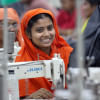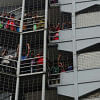It’s time to look forward with our fashion partners

In the aftermath of the former prime minister's resignation, the country is now ready to put the challenges of the last few weeks behind it. The nationwide curfews had been withdrawn on August 6, and since then, banks, schools, factories, etc. have been re-opened and people have started their normal daily lives. The apparel factories of the country have resumed production on August 7.
So, what does all this mean for our country? The focus of this article is from a business perspective. However, the people of Bangladesh can attest to how the past few weeks of civil unrest have certainly taken their toll on an emotional level as well.
My overriding message, as somebody who lives and works in Bangladesh, is that our garment manufacturing sector remains very much open for business. But first, we need to look at what the business community needs from our state and non-state institutions to help Bangladesh regain the confidence of its international business partners.
As stated earlier, it has been a very challenging time, but I believe that the resignation of the former prime minister and the installation of the army chief might help to restore stability. It is time to start looking forward.
Bangladesh gained its independence from Pakistan in 1971, meaning that we are still a relatively new country and the path to development has been a bumpy road. However, Bangladesh's recent problems are part of a larger historical pattern of political and social challenges. Thus, the country's history of overcoming adversity and its commitment to economic development should provide a foundation for optimism.
Over the years, the garments industry of Bangladesh has established itself as one of the key powerhouses in the country, bringing in vital export earnings. In the fiscal year 2022-23, garment exports from Bangladesh earned $47.38 billion and the value is expected to grow year-on-year.
Despite the recent political unrest, Bangladesh's garment industry still remains a cornerstone of our economy. The industry accounts for more than 80 percent of the country's export earnings and provides employment to millions of people, particularly women.
Let us also not forget the sector has played a crucial role in lifting millions out of poverty and improving living standards. There are ambitions to increase exports well beyond US$50bn and, in doing so, lift many millions more people out of poverty.
But in order to achieve those goals, we need the support of the international community, and the backing of international fashion buyers.
It goes without saying that the international community may have read newspaper reports or even seen video footage of the political unrest that has occurred over the last few weeks, and have developed concerns about placing their orders here. Therefore, we simply cannot assume that the support from the international community will be readily available—it must be earned.
To maintain or regain the trust of the international business community, I believe three things need to happen over the coming weeks.
The first is that our country's new leadership needs to outline a clear roadmap for how Bangladesh will avoid further disturbances moving forwards. What safeguards do they have in place, which actors will be involved in bringing all parties around the table, and how can we ensure the unrest of the past few weeks does not happen again?
Secondly, we need transparency and openness. We cannot keep the international business community in the dark about developments in our country. Silence on these key issues can have a negative impact, as it creates a vacuum. This can lead to the spread of rumours and mistruths, which has happened in the past few weeks.
Going forward, our leaders need to own the conversation. Historically, public relations have not been one of Bangladesh's strong suits. However, how we project ourselves to the international community is vital given the present situation. Clear, authoritative, and unambiguous messaging will be key from this point onwards.
Finally, we need a unified voice—we need solidarity. Partnership and collaboration are in all of our best interests right now. We need to present a united front and disagreements must be sorted out swiftly for the greater good.
My concluding message to clothing buyers is to stand by us at this critical juncture and to continue placing orders with confidence as we head into the vital Christmas order season. Your partnership and support are more vital than ever.
Mostafiz Uddin is the managing director of Denim Expert Limited. He is also the founder and CEO of Bangladesh Denim Expo and Bangladesh Apparel Exchange (BAE).
Views expressed in this article are the author's own.
Follow The Daily Star Opinion on Facebook for the latest opinions, commentaries and analyses by experts and professionals. To contribute your article or letter to The Daily Star Opinion, see our guidelines for submission.

 For all latest news, follow The Daily Star's Google News channel.
For all latest news, follow The Daily Star's Google News channel. 










Comments